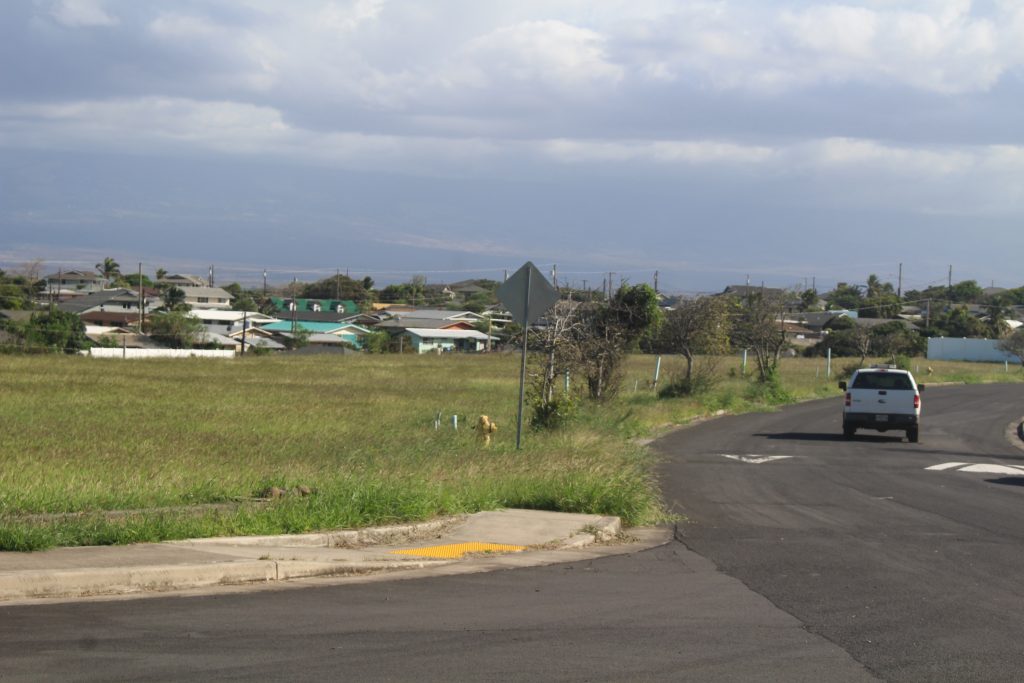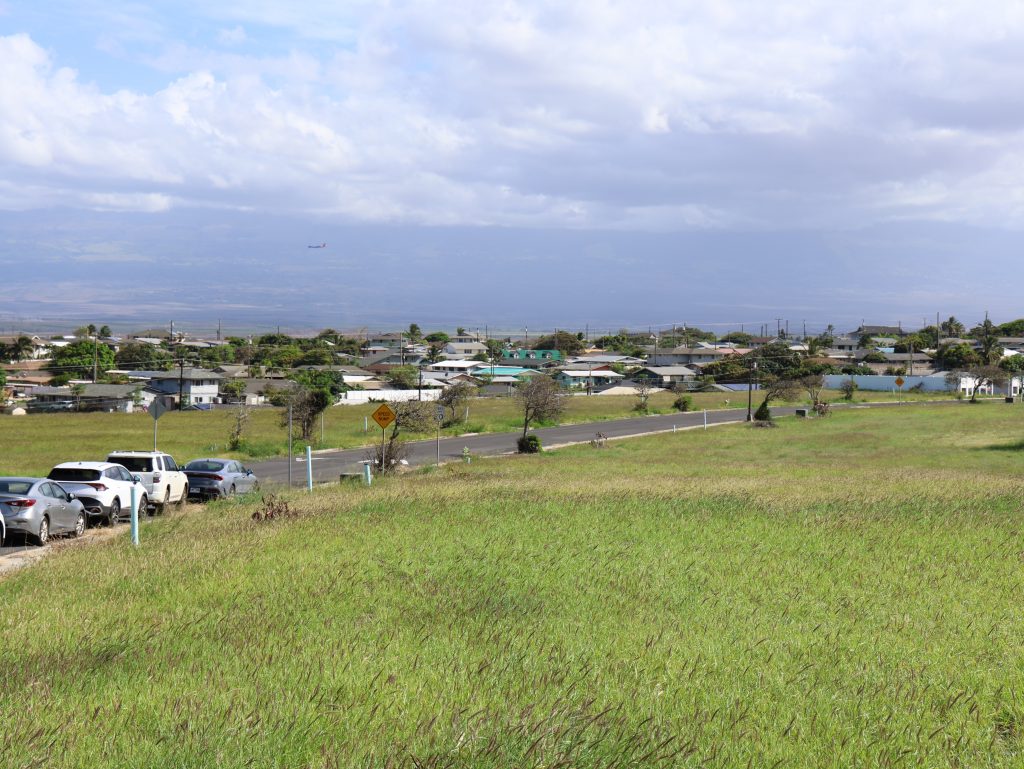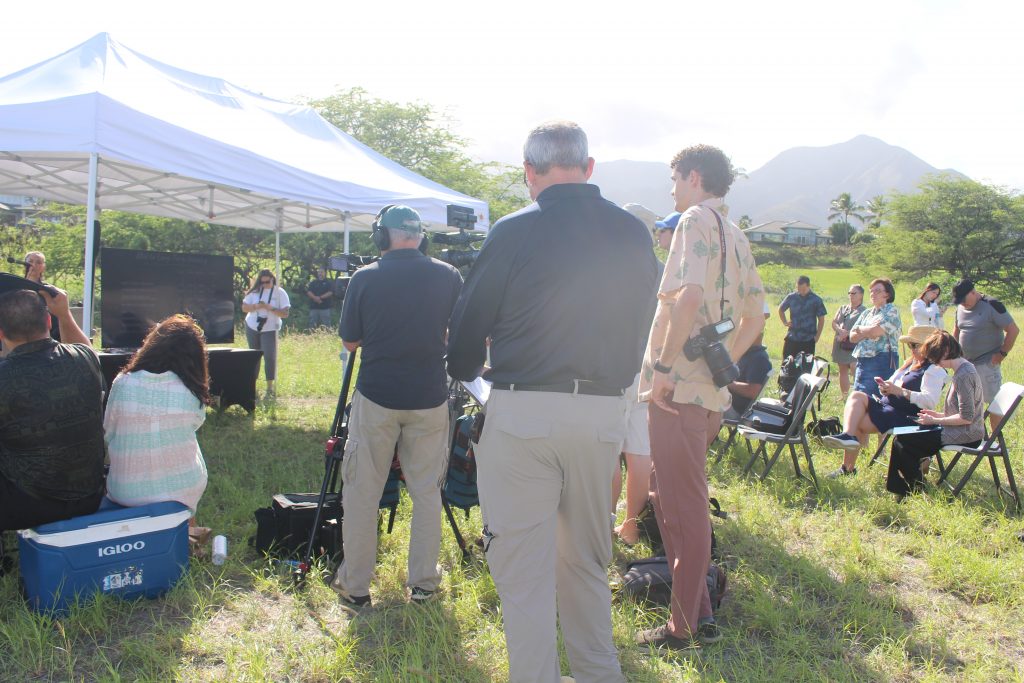Government, nonprofit partners join to launch $500M Maui Interim Housing Plan, unveil shovel-ready lot at Maui Lani
Kahului, MAUI—Governor Josh Green, M.D. joined Maui Mayor Richard Bissen and nonprofit partners on Friday in announcing a $500 million Interim Housing Plan for Maui in response to the urgent housing needs brought on by the Aug. 8, 2023 wildfires.
In addition to the state of Hawai‘i and the County of Maui, other partners include the Hawai‘i Community Foundation, Council for Native Hawaiian Advancement, Federal Emergency Management Agency and the American Red Cross. Collectively they have committed the funds to create a pool of more than 3,000 stable housing units with 18-month commitments by July 1, 2024.
The announcement was made at Maui Lani in Kahului, a portion of which is included in the plan as one of the future build sites. The site, located at the end of Kea Street in Kahului near hole 12 of the Dunes at Maui Lani Golf Course, includes 17 county-owned lots that will be used to accommodate 34 modular units for accessory dwellings with the help of the Hawaiʻi Community Foundation. The county is negotiating with Na Hale O Maui for another 17 lots that could potentially hold an additional 34 units.
For the county-owned lots, the Hawai’i Community Foundation will financially commit to purchasing the units, and the Council for Native Hawaiian Advancement will help to get families into the units and manage the property for the next few years.
“They’ll be here in the islands, hopefully within the next eight weeks… The hope is that we will be moving families in as soon as 3 or 4 months from today,” said CNHA President and CEO Kūhiō Lewis.
The objectives are to enhance availability of resilient and affordable housing; Provide support to affected homeowners; Reinforce housing infrastructure and increase resilience; Align housing solutions with evolving workforce needs; ensuring stability and sense of security.
Transition timeline:
The collective goal is to move all individuals and families who are in short-term hotels into long-term stable housing by July 1, 2024, according to the joint announcement.
Currently, there are 2,400 households, totaling more than 5,928 individuals, that are being housed in 33 hotels with the Non-Congregate Sheltering program in partnership with the American Red Cross and the state.
The Maui Interim Housing Plan outlines a phased approach to delivering housing, prioritizing options that produce permanent housing, efficient use of funds, and readiness for move-in by survivors, according to the announcement. The plan includes: residents returning to original unharmed residences, the Host Housing Support Program, direct leasing, short-term rental transitions to long-term rentals, and new permanent developments.

“We estimate that $200 million in FEMA reimbursable costs have been put out so far. Our goal is to move these survivors into more safe and secure housing within the next 30 days. We’re leveraging the Direct Housing program, evaluating the need for group sites, and supporting the relationship mentioned today to make this happen,” said FEMA Field Coordinating Officer TJ Dargan.

While the Non-Congregate Sheltering program is slated to end on Feb. 10, 2024, FEMA has received an extension request from the governor, and is evaluating an extension for FEMA eligible individuals who do not have alternative housing options available.
“As we continue reviewing this request, I want to reiterate that any extension would be for hotels only, as we are actively pursuing condos for survivors in our Direct Lease program,” said Dargan.
He said the goal for getting FEMA eligible people moved from non-congregate shelters at hotels to units in the Direct Lease program is 30 days. So far, 70 families have made the transition.
“Our aspirations are to get enough long-term rentals converted over for us,” said Gov. Green. “We need that, and so, if we can make an appeal… please, look into your hearts, take up the offers that are being made by all of our partners… and rent your short-term rentals, long-term for fair market value. Take advantage of the property tax breaks that the county has generously offered—that is where this 1,500 number will come from.”

“From a heartfelt space, we would have loved to do this sooner rather than later. It’s just a long, complex process to build or to get a major transition from short-term rentals to long-term rentals… We’ve begun the process in some cases, but as you can see, and heard before, about 25% of people have been able to be moved from short-term hotels,” said Gov. Green.

“Our next big move is not scheduled until the end of the month, but even that, like all hotel contract deadlines, our national lodging team is actively working to extend those as long as possible to ensure the stability of our clients,” said American Red Cross Assistant Director of External Relations Mary Simkins.
At the peak of the Non-Congregate Sheltering program, there were more than 8,000 individuals were placed in temporary emergency shelters. “We are now just under 6,000, almost 5 months in, so that’s more than 25%,” said Simkins.
“As individuals and families move out of their temporary emergency shelters, our shelter resident transition teams are standing by, ready to answer any questions and concerns and treat each individual as an individual and make sure they are comfortable moving into their next chapter.”
Memorandum of Understanding:
Collaboration, commitment and certainty
A Memorandum of Understanding was signed on Friday to solidify the shared commitment aimed at addressing the immediate housing need of those still residing in hotels.
It was developed under the Maui County Office of Recovery Office, and led by acting Managing Director Josiah Nishita. Members of the are already meeting regularly “to drive scalable solutions” to assist the more than 12,000 individuals affected by the Maui fires.

“Today is about collaboration, commitment and certainty. Those are the things that we are trying to achieve through this effort,” said Mayor Bissen who joined in signing the MOU. “This is an ambitious initiative… This is a bold time for us to extend housing support for up to two years (24 months)… This commitment holds all of us accountable to deliver on these options over the next several months,” he said.

“This MOU is more than just a funding agreement,” said Hawai‘i Community Foundation President and CEO Micah Kāne. “I look it as an operating agreement, an accountability document, and it will be something that we’re going to be able to develop a scorecard and a dashboard to be reporting out our performance over time. It’s also the result of the convening of the Maui County recovery support function.”

The Council For Native Hawaiian Advancement has been sharing key data on housing in an effort to identify solutions. CNHA is also administering several programs, including the Host Housing Support Program that started as a pilot project in October. It currently provides financial assistance to more than 200 households throughout the state, who are housing more than 500 affected individuals and families. CNHA anticipates that 300 more households will sign up for the program in the coming months.
CNHA also launched a centralized housing website recently to match up survivors and landlords. HelpingMaui.org helps survivors find housing, while also serving as a platform for property owners and managers to offer their properties to displaced residents.

“There is no easy solution to address the housing crisis on Maui. It’s a kāko‘o effort that will take government, private sector, philanthropy and the community working in partnership to overcome this crisis situation,” said Council for Native Hawaiian Advancement President and CEO Kūhiō Lewis. “The road ahead will be long and challenging, but not impossible when we do it together.”
Lahaina Strong: “We cannot wait another day.”
The announcement comes as the Lahaina Strong “Fishing for Housing” occupation on Kāʻana-pali Beach enters a 57th day. Organizer Courtney Lazo said urgent action must be taken now.
“We cannot wait another day, let alone another 2 to 6 months for the urgent action that is needed. While it’s nice that the Governor and Mayor are now starting to listen, the over 3,000 families like mine who spent the holidays in these undignified hotel situations cannot wait until March or July to have kitchens, places for their pets, or enough space for their keiki and kūpuna,” said Lazo.

Lewis took a moment to recognize those who have been vocal in their stand for immediate housing solutions.
“I think it’s important that everybody has kuleana, they all have responsibility, have a role. I want to give a shoutout to those that have been down in Lahaina on the beach, calling for housing,” said Lewis. He thanked the group for keeping the pressure on saying, “This is at the end of the day, this is in response to that kāhea (call). We also recognize how important it is, and now we’re responding.”
Lahaina strong continues to advocate for the immediate conversion of short-term vacation rentals and empty homes, to house fire survivors.
“It’s time to do what should have been done months ago: act urgently. using executive authority to convert the short-term rentals and empty homes to long-term housing. With over 27,000 on Maui, only a fraction are needed, and we cannot wait another day. The Governor and Mayor must act now, and we will be relentless in bringing the crisis that survivors are feeling every day to decisionmakers conscience until they lead with the urgency that the workers who make West Maui run are feeling every day,” said Lazo.
Partners say their ambitious housing initiative ensures stability and a sense of security during challenging times, and provides individuals and families with an opportunity to look forward.
“We mahalo our more than 250,000 donors from around the world who gave to the Maui Strong Fund. It’s with their support that we can ensure that individuals and families affected by the fires can have hope for their next chapter,” said Hawaiʻi Community Foundation President and CEO Micah Kāne. “This is just one of the many ways that HCF is convening partners and deploying its resources to support Maui’s people and places.”
“When you look at the 1,500 units sitting in the short-term rental, we want to drive that number down,” said Kāne, calling the MOU a moral and value commitment. “We want to do as much permanent build as possible, and I think that’s really where our performance is going to be measured.”
By the numbers, how to help
To date, FEMA has approved more than $41 million in assistance to the individual and households program. A total of $15.7 million has been provided in rental assistance to 3,861 households. Approximately 300 households have received or applied for continued rental assistance.
“Hopefully through partnerships like this one, this number will increase,” said Dargan. “Under FEMA’s Direct Housing program, eligible survivors are matched to a suitable unit for up to 18 months. Approximately 1,500 survivors are eligible for direct housing.”
As of Friday, FEMA had identified 600 units, and was pursuing 1,000 more.
“FEMA’s financial assistance has been a critical piece to addressing the immediate housing needs on Maui,” said Gov. Green. “In addition to the $250 million FEMA is providing for hoteling and rental assistance to individuals, FEMA is currently leasing approximately 1,500 units to house survivors and is designing multiple group sites to house up to 500 households in Accessory Dwelling Units. The estimated costs for these efforts total an additional $450 million, which greatly enhances our ability to house all who need it. This partnership is unprecedented and critical to our collective success as a state.”
Those interested in leasing units to FEMA for the Direct Lease program, are invited to email [email protected] or call 510-499-6069.

The parties have committed initial contributions as follows:
- Federal Emergency Management Agency (FEMA). $250,000,000
- State of Hawai‘i. $150,000,000
- County of Maui. $40,000,000
- Hawai‘i Community Foundation, Maui Strong Fund. $50,000,000
- CNHA, Kākoʻo Maui Fund. $5,000,000
- Other Philanthropy. $5,000,000
Total: $500,000,000


























